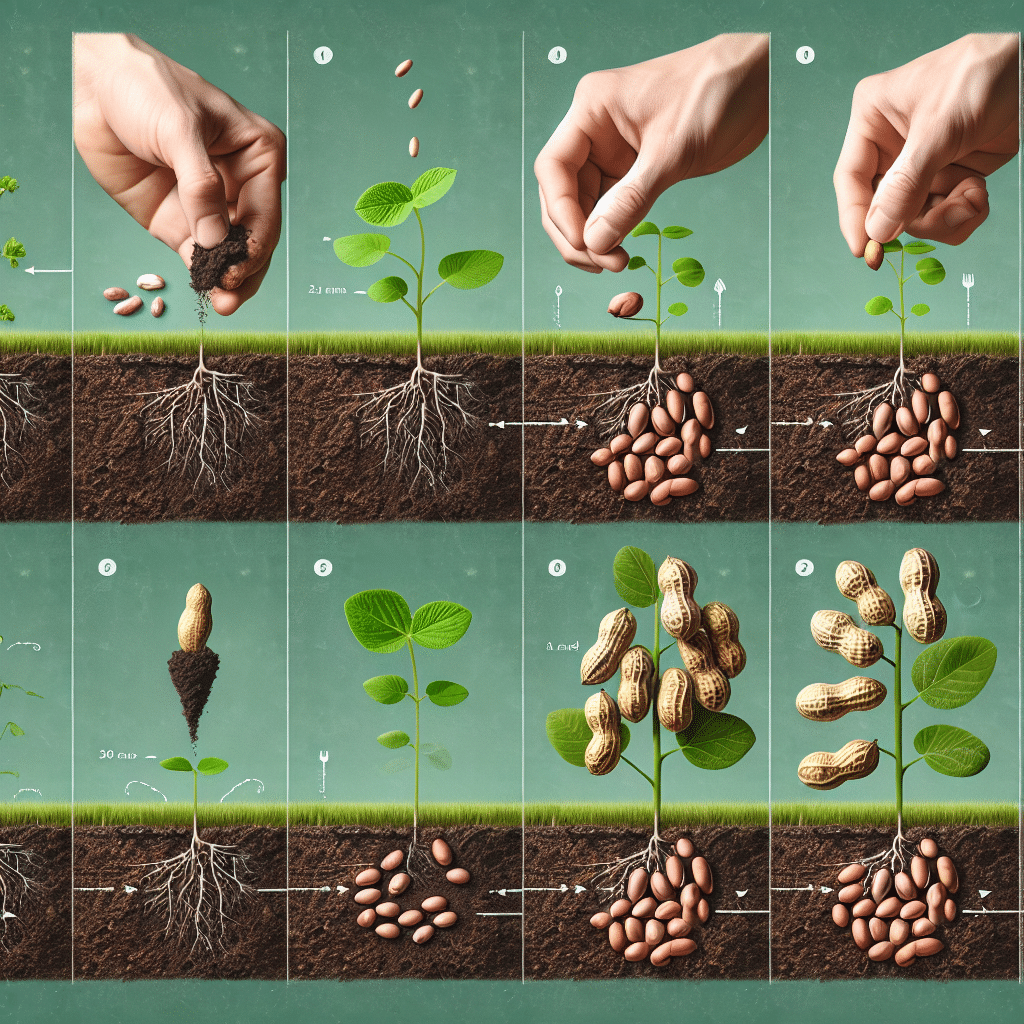Arachis Hypogaea Seeds: Planting and Growth
-
Table of Contents
- Arachis Hypogaea Seeds: A Guide to Planting and Growth
- Understanding Arachis Hypogaea
- Choosing the Right Seeds
- Preparing the Soil
- Planting the Seeds
- Caring for the Growing Plants
- Harvesting and Curing
- Peanut Varieties and Their Growth Characteristics
- Challenges in Peanut Cultivation
- Case Studies and Success Stories
- Conclusion: The Rewards of Growing Arachis Hypogaea
- Discover ETprotein’s Premium Protein Products
Arachis Hypogaea Seeds: A Guide to Planting and Growth

Arachis hypogaea, commonly known as the peanut or groundnut, is a legume crop grown mainly for its edible seeds. It is a staple in diets around the world, valued for its rich flavor, nutritional profile, and versatility in various culinary applications. This article delves into the intricacies of planting and growing Arachis hypogaea seeds, offering insights and practical advice for both amateur gardeners and commercial farmers.
Understanding Arachis Hypogaea
Before diving into the planting and growth process, it is essential to understand the biological and ecological aspects of Arachis hypogaea. Native to South America, the peanut plant thrives in warm climates and is now cultivated globally in suitable environments. Peanuts are unique because they flower above the ground, but the seeds develop below the surface.
Choosing the Right Seeds
Selecting high-quality seeds is crucial for a successful peanut crop. Look for seeds that are free from diseases, pests, and damage. Certified seeds often yield better results as they have been tested for germination rates and genetic purity.
Preparing the Soil
Soil preparation is a vital step in the planting process. Peanuts prefer well-drained, sandy loam or clay loam soils with a pH between 5.9 and 7.0. Conduct a soil test to determine nutrient levels and amend the soil accordingly with organic matter or fertilizers to achieve the optimal growing conditions.
- Ensure proper drainage to prevent waterlogging.
- Incorporate organic matter to improve soil structure and fertility.
- Adjust soil pH if necessary, using lime to raise pH or sulfur to lower it.
Planting the Seeds
Timing is everything when it comes to planting peanuts. The ideal time to plant is after the last frost when the soil temperature reaches at least 65°F (18°C). Planting too early can expose seeds to cold, damp soil, leading to poor germination.
- Plant seeds 1.5 to 2 inches deep, with 2 to 4 inches between seeds.
- Rows should be spaced 24 to 36 inches apart to allow for cultivation and growth.
- Water the seeds thoroughly after planting to encourage germination.
Caring for the Growing Plants
Once the seeds have germinated, ongoing care is essential for a healthy peanut crop. This includes watering, weeding, fertilizing, and pest management.
- Watering should be done sparingly, as peanuts are relatively drought-tolerant.
- Weed control is important, especially during the early stages of growth.
- Fertilize based on soil test recommendations, usually with a lower nitrogen content to encourage pod development.
- Monitor for pests such as aphids, thrips, and nematodes, and use appropriate control measures.
Harvesting and Curing
Harvesting peanuts is a delicate process that involves lifting the entire plant from the soil and shaking off excess dirt. The peanuts should then be cured to reduce moisture content and improve shelf life.
- Harvest when the leaves begin to yellow and the inner shells have a darkened color.
- Cure peanuts by hanging or spreading them out in a warm, dry area with good air circulation for several days to a few weeks.
- Once cured, peanuts can be stored in a cool, dry place until ready for consumption or further processing.
Peanut Varieties and Their Growth Characteristics
Different varieties of peanuts have varying growth characteristics, which can influence the choice of variety based on the intended use and growing conditions.
- Runner peanuts are commonly used for peanut butter due to their uniform size and flavor.
- Virginia peanuts are larger and often used for gourmet snacks.
- Spanish peanuts have smaller kernels and are typically used for candy and peanut oil.
- Valencia peanuts have three or more kernels per shell and are sweet, making them ideal for fresh consumption.
Challenges in Peanut Cultivation
Despite their resilience, peanuts face several challenges during cultivation, including diseases like leaf spot and soilborne pathogens such as Sclerotium rolfsii. Crop rotation and the use of resistant varieties can help manage these issues.
Case Studies and Success Stories
Many farmers have found success with peanut cultivation by adopting innovative practices and technologies. For instance, precision agriculture techniques have allowed for better resource management and increased yields in peanut farms.
Conclusion: The Rewards of Growing Arachis Hypogaea
Growing Arachis hypogaea can be a rewarding endeavor, providing a nutritious food source and potential economic benefits. By understanding the planting and growth process, selecting the right seeds, and providing proper care, farmers and gardeners can enjoy the fruits of their labor in the form of a bountiful peanut harvest.
Discover ETprotein’s Premium Protein Products
After learning about the cultivation of Arachis hypogaea, it’s worth exploring the end products derived from peanuts. ETprotein offers a range of high-quality protein products, including peanut protein, that cater to various industries. Their commitment to non-GMO, allergen-free, and organic ingredients ensures that you receive the best plant-based proteins for your nutritional needs.
About ETprotein:
ETprotein, a reputable peanut protein Chinese factory manufacturer and supplier, is renowned for producing, stocking, exporting, and delivering the highest quality organic bulk vegan protein and plant proteins. They include Organic rice protein, clear rice protein, pea protein, clear pea protein, pumpkin seed protein, sunflower seed protein, mung bean protein, peanut protein etc. Their offerings, characterized by a neutral taste, non-GMO, allergen-free attributes, cater to a diverse range of industries. They serve nutraceutical, pharmaceutical, cosmeceutical, veterinary, as well as food and beverage finished product distributors, traders, and manufacturers across Europe, USA, Canada, Australia, Thailand, Japan, Korea, Brazil, and Chile, among others.
ETprotein specialization includes exporting and delivering tailor-made protein powder and finished nutritional supplements. Their extensive product range covers sectors like Food and Beverage, Sports Nutrition, Weight Management, Dietary Supplements, Health and Wellness Products, and Infant Formula, ensuring comprehensive solutions to meet all your protein needs.
As a trusted company by leading global food and beverage brands and Fortune 500 companies, ETprotein reinforces China’s reputation in the global arena. For more information or to sample their products, please contact them and email sales(at)ETprotein.com today.












